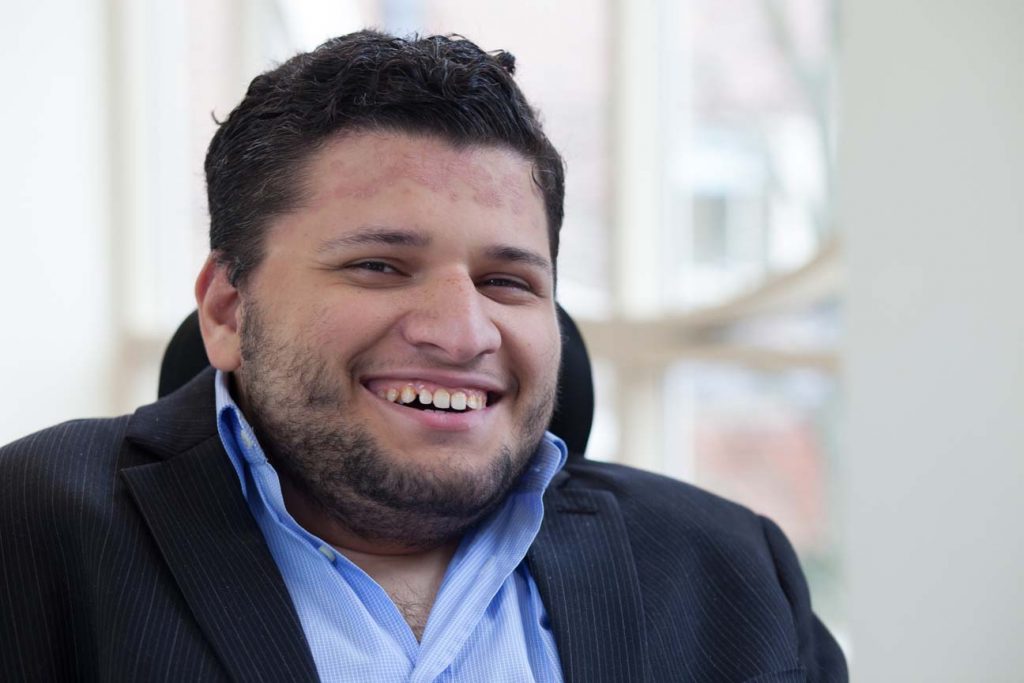Amid the early chaos following President Trump’s executive order January 27 to halt immigrants from entering the US from seven Muslim-majority countries, came a number of voices from members of the BC Law community. Among the first were student Mousa al Mosawy ’18 and alumna Susan Finegan ’91, followed by Professors Daniel Kanstroom and Kari Hong.
Mousa, a student leader, aspiring lawyer, and activist in his mother’s Iraq Health Aid Organization, on Saturday recounted to the Guardian a call he took from his tearful mother in Iraq, fearful of the implications of Trump’s action. Mother and son were forced to confront a possible new reality in Mousa’s ability to travel back and forth to his home country of Iraq and of his right to remain in American to finish his law degree.
Mousa, who was born with scoliosis and uses a wheelchair, told the newspaper that he doubts he could finish his education or build a career if he were required to return home. He has studied in the US for some time, receiving his undergraduate degree from UMass Amherst before entering BC Law. Mousa’s chagrin at this turn of events is deepened by the fact that until now he has always felt welcome in the US. “It was a stark contrast to what I had experienced recently,” he said.
Across town and a few hours after Mousa’s conversation with the Guardian, Finegan, the pro bono partner at Mintz Levin in Boston and a longtime social justice champion, left a gala she was attending and headed to the federal courthouse to assist fellow attorneys in a successful attempt to obtain a seven-day restraining order against Trump’s directive. “We all raced over to help,” Finegan told the Boston Globe.
Finegan said in an interview with BC Law Magazine that she and colleagues at Mintz, the ACLU, and AILA (the American Immigration Lawyers Association) had been talking throughout the day about what to do about Trump’s order. “It was a crazy situation,” she said. When word came that evening that a judge would hear a petition for a restraining order, she and the others leapt into action. Thinking the judge would show up at Logan Airport where protests were under way, Finegan, her husband, and a few colleagues raced to the airport, only to discover that the proceeding would take place at the US District Court. They headed there, and by 1:45 a.m. Sunday morning, they had a signed restraining order.
That battle won, Finegan said, “The situation is so fluid, I doesn’t know what will happen next.”
In following days, Hong and Kanstroom have also been heard from.
Hong, an immigration attorney, was asked by the Globe to explain the meaning of “sanctuary city” and was interviewed by the Boston Herald as to the chances of a lengthy legal battle over Trump’s executive order.
Professor Daniel Kanstroom, co-director of the BC Center for Human Rights and International Justice, was quoted in a major Globe Magazine feature on Trump’s “anti-immigration playbook.” He also circulated a statement of protest by the center over Trump’s order, which says that the center “continues to stand in solidarity with refugee and migrant communities of all faiths.” It concludes with Emma Lazarus’ poem “The New Colossus,” containing this promise to immigrants:
“Give me your tired, your poor,
Your huddled masses yearning to breathe free,
The wretched refuse of your teeming shore.
Send these, the homeless, tempest-tossed to me,
I lift my lamp beside the golden door!”
Photograph by Adam DeTour


